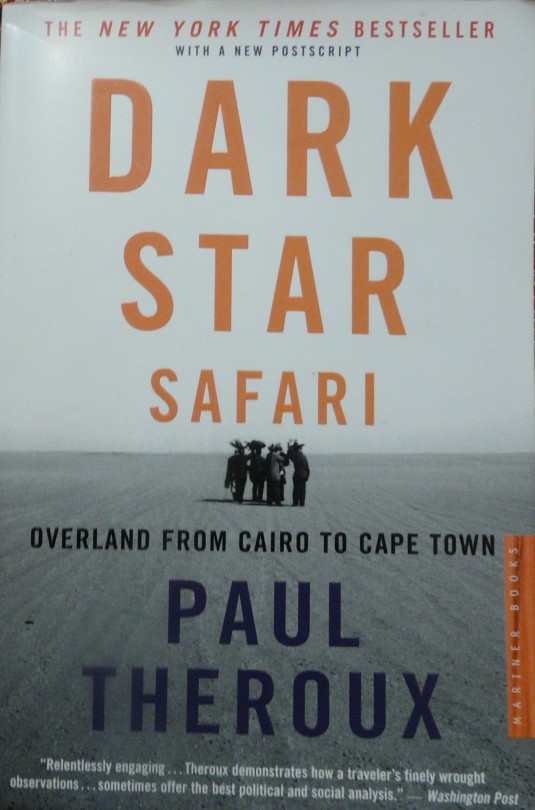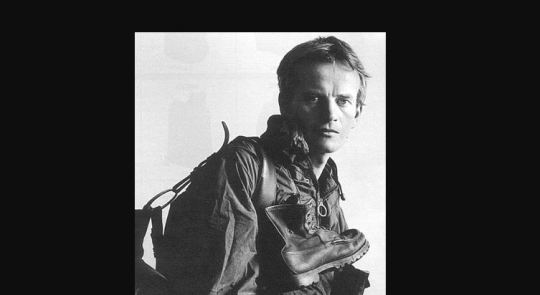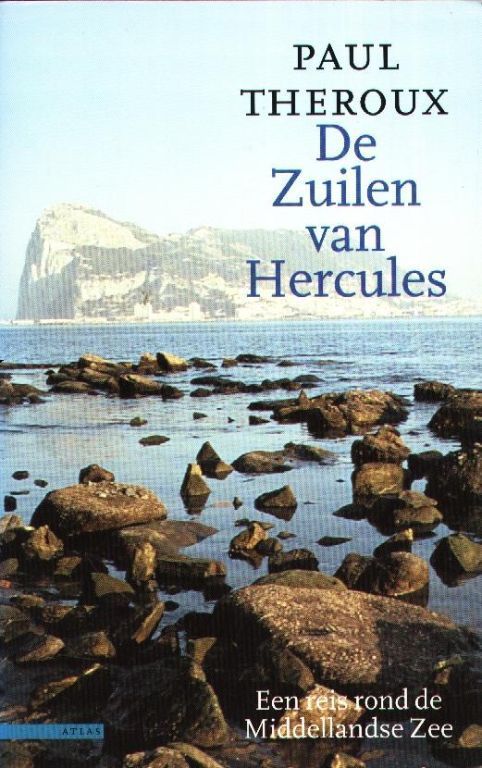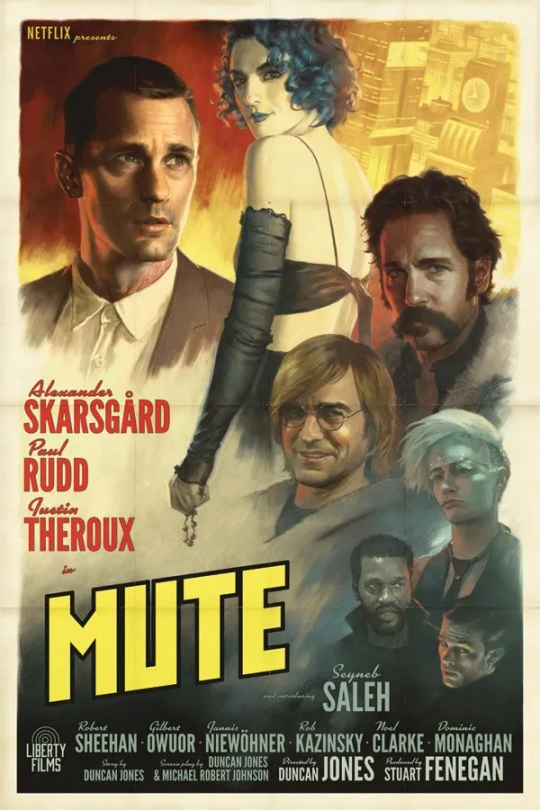#paul theroux
Explore tagged Tumblr posts
Text










Paul Theroux, “Dr. DeMarr” (Hutchinson, 1990), with front and back cover and interior illustrations by Marshall Arisman.
10 notes
·
View notes
Quote
In travel, as in many other experiences in life, once is usually enough.
Paul Theroux
2 notes
·
View notes
Text

Chicago Loop (1990)
Paul Theroux
Random House
4 notes
·
View notes
Text

The Vanishing Point: Stories
By Paul Theroux.
Design by Pete Garceau.
2 notes
·
View notes
Text

Book Review
Dark Star Safari: Overland from Cairo to Cape Town
by Paul Theroux
Two decades ago, the novelist and travel writer Paul Theroux took an overland trip through Africa, starting in Cairo, Egypt and ending in Cape Town, South Africa. This certainly isn’t the safest or the most comfortable means of experiencing the supposed “dark continent”, but it makes for some interesting experiences and insights. Keeping in mind that Theroux’s observations are just one point of view among many, his resulting book Dark Star provides a unique look at a region of the world that holds a permanent place off the beaten path.
While Dark Star is an easy book to read, breaking it down into its individual elements is a good way to approach its merits and examine its flaws. The first element of importance is Theroux’s sense of place. Wherever he goes, the author describes what he sees and the vibe he gets from his surroundings. Starting on the tourist trail in Egypt, he heads south through Sudan, Ethiopia, Kenya, Tanzania, Uganda, Malawi, Zimbabwe, Mozambique, Zambia, and South Africa. You quickly get a sense of what he appreciates and what he doesn’t. He doesn’t like sites that are swarmed with tourists, nor does he like cities with their concentrations of crime and poverty. He also doesn’t like the “death traps” as he calls public transportation which are usually over-croded minivans driven at dangerous speeds on poorly maintained roads, pockmarked with hippopotamus-sized potholes. If you’ve ever traveled in a Third World country, you will know exaclt what he is talking about.
The places that Theroux does like are usually rural, especially farm lands or jungle villages. These are the places where he sees Africans at their best, meaning Africans being Africans in the absence of corrupt and filthy cities built up on the foundations of European colonialism. Some of the book’s best passages involve descriptions of the pyramids in Sudan which are rarely seen by tourists, a boat trip across Lake Victoria, another boat trip from Malawi across the Zambezi over the border into Zimbabwe, and the pristine countrysides of Zimbabwe and South Africa. All places, whether Theroux likes them or not, are described with language that is clear, simple, and direct, making it easy to visualize what he sees.
Another element that is done to near perfection is writings about the people. Theroux talks with tour guides, people on the streets and in the villages, farmers, nuns, educators, government officials, Indian businessmen, prostitutes, authors, intellectuals, and ordinary people. Just like with the places he goes, he describes these people vividly with precision so that you feel like you quickly get to know them. But not everyone is to his liking. He gets into small argument with a fanatical Rastafarian in Ethiopia, a little ornery with physically fit young men who refuse to work, government officials who demand bribes to do their jobs, and he really gives a hard time to a young American missionary woman about the psychological damage that her evangelical ministry is doing to the local people. There is also plenty of anger directed at clueless tourists as well as NGO and charity workers who he sees as being the Westerners who do the most damage to Africa.
The third element of importance is the author, Paul Theroux himself, and his thoughts and commentaries on everything he sees. Before getting into this subject, it should be mentioned that Theroux had a purpose to his journey. In the 1960s he worked as a Peace Corps volunteer, teaching in Malawi. After getting involved with a Leftist political group, he got fired then accepted a teaching position at a college in Uganda. He wanted to return and see what results, if any, his contributions to Africa grew into. What he found was a major disappointment. The charming campuses and villages where he had lived were in ruins and instead of a thriving civilization, he saw emaciated beggars, starving children, an ignorant populace, and chronically corrupt politicians. Shops that were formerly owned by Indian immigrants were abandoned and burnt to the ground, the result of a campaign of ethnic cleansing. African people wanted to buy from shops owned by Africans, but Africans never took control over the businesses after the Indians were killed or chased away. They resorted to begging, theft, petty crime, prostitution, and laziness instead of making an effort to build better villages for themselves. Due to the hopelessness of African society, the most educated citizens fled to America or Europe instead of staying in their home countries where they were most needed.
Throughout his travels in Tanzania, Uganda, and Malawi, Theroux gets increasingly bitter and cynical. He wanted to see Africans thriving and they weren’t. He directs all his wrath towards the Western charities and NGOs who he says are making the local people dependent on aid rather than learning how to run their societies for themselves. Even worse, these organizations work by bribing corrupt politicians to allow them to do work there, keeping greedy and psychotic leaders in positions of power they don’t deserve. Theroux points out that rural people who have given up on the hopeless market economy and returned to subsistence farming are the happiest and healthiest Africans he encounters. Heecomes close to advocating for a type of post-capitalist agrarian anarchism.
Some readers have criticized Theroux for his pessimistic views on contemporary Africa, but he does cite studies that support what he says. He also encounters a lot of Africans in several different countries that agree with him. To make sense of his negativity, you also have to remember that traveling overland through Africa is not exactly stress free. Anybody who has been on an extended backpacking trip anywhere in the world will tell you that traveler’s fatigue is a real thing. Theroux took a longer than average trip through one of the most underdeveloped regions in the world, got shot at by Somali bandits, stuck in the middle of nowhere when his transportation broke down, and got sick with food poisoning, magnifying his traveler’s fatigue to a outsize extent. These circumstances would make you grouchy too. But even in the darkest times, Theroux never loses his appreciation for Africa, the wildlife, the landscapes, and the people who are trying to make the best of their situations. Besides, by the time he crosses the river from Malawi into Zimbabwe, his mood really lightens up.
Dark Star is an engaging travelogue that should be read both critically and with an open mind. All the while, remember that this is Paul Theroux’s singular point of view. That doesn’t make it wrong; that just means that there are other points of view to take into account that may go against what he says even if they don’t necessarily invalidate his opinions. He saw what he saw and he expresses it well. This is raw and honest travel writing and if you haven’t been tough enough to make the same kind of journey, you’re not in a good place to be judgmental of the conclusions he draws.
5 notes
·
View notes
Text
Review of Birthday Stories Selected and Introduced by Haruki Murakami
Oh this one was so interesting. It’s a connection of stories centering or touching on the topic of birthdays. Murakami compiled this anthology and added a short story to accompany it, along with his introduction. The stories were excellent, and each had their own merits and revealed things about their cultural contexts and experiences, which I always find fascinating. I think the thing I want to focus on, though, in this little writing exercise that I catapult into the void, is Murakami’s introduction.
First, the topic of birthdays. What a whimsical little topic to pick. What a silly thing to write about. In some of these stories, the birthday is obviously central. In others, it is merely noted- all of the events would’ve unfolded anyway- but it changes the lens through which we read the story. We can assign such high expectations to this day- our birthday, our parent’s birthday, our partner’s birthday. I, for one, love birthdays! I think it’s a wonderful excuse to celebrate yourself and the people that you love. But we put so much pressure on it. Many of these writers go dark with the birthday stories- birthday strife, birthday tragedy, birthday awkwardness. And it’s so easy to do so: we are supposed to be at such a high, it is incredibly easy to be brought down low, to feel that tension that makes a story a story. We can discuss to what extent the “perfect” birthday is even a myth. Are these sad birthday stories the closest we will get to reality?
The second thing that really struck me was Murakami’s first person writing style in the introduction and this blurbs about the authors. I thought it was so cute and comical. I thoroughly enjoyed it. It strayed far from his usual third person mystical narratives that are a sign of his almost autor nature of writing. It also was jarring then, when I read his story, that I was immediately thrust back into that world of immateriality and surrealism. His ability to shift between the conversational and simple writing to heavily artistic and philosophical writing was interesting to witness within the same 200 pages.
The last thing was just a little point of order that I found to be interesting. He published this book both in Japanese and in English, where he says he did most of the translating work himself into Japanese from the original English of many of the short stories. This surprised me when I read it because I didn’t know he did translations. Most of the work of his that i’ve read has been translated by someone else. What surprised me even more was that when it came time for his story, he wasn’t the one that did the translation from Japanese to English. That boggles my mind a little bit. If you have translator capabilities, wouldn’t you be the most capable one to translate your own work. He would be the one most able to retain the intention and mood behind every sentence. That was just odd to me.
#book review#bookblr#book recommendations#book#birthday stories#haruki murakami#anthology#short stories#russel banks#ethan cabin#raymond carver#david foster wallace#denis johnson#claire keegan#andrea lee#daniel lyons#lewis robinson#lynda sexson#paul theroux#william trevor#japanese author#japanese literature
0 notes
Text
0 notes
Text
0 notes
Text
Le voyage, prévient-il dès les premières pages, est un acte évanescent, la randonnée d'un solitaire le long de l'étroite ligne qui mène de la géographie à l'oubli... Mais le livre de voyage est l'inverse, le solitaire rebondit plus haut que dans la vie pour relater l'histoire de son expérience avec l'espace... C'est le mouvement mis en ordre par sa répétition dans des mots.
1 note
·
View note
Text
Bruce Chatwin (1940-1989)
Het is al 35 jaar geleden dat “de Engelse Boudewijn Büch” Bruce Chatwin is overleden. Continue reading Untitled

View On WordPress
#André Malraux#Boudewijn Büch#Bruce Chatwin#Eileen Gray#John Betjeman#Nicholas Shakespeare#Paul Theroux#Robert Mapplethorpe#Salman Rushdie
1 note
·
View note
Text
Paul Theroux – De zuilen van Hercules
De reisverhalen van Theroux zijn altijd leuk om te lezen, omdat hij een heerlijke atypische reiziger is. Als iets populair is, zal hij een andere route kiezen. Als hij zich als een local kan gedragen, doet hij dat. Hij slaapt in slechte hotels, zwerft door lelijke buurten en praat met velen om zodoende te weten wat er speelt in een land, niet wat de reisgidsen zeggen wat hij zou moeten zijn. In…

View On WordPress
0 notes
Text

















Wanderlust (2012) | deleted scene
#wanderlust#kathryn hahn#paul rudd#justin theroux#george gergenblatt#karen#seth#movieedit#movieedits#filmedit#filmedits#kathrynhahnsource#my gifs#edit
35 notes
·
View notes
Text










NORMAL PEOPLE (2020) THE LEFTOVERS (2014-2017)
#normal people#the leftovers#normalpeopleedit#theleftoversedit#paul mescal#justin theroux#daisy edgar jones#carrie coon#tvedit#tvgifs#televisiongifs#the birds always fly home#the music in these scenes DONT even UGHH
28 notes
·
View notes
Text

#alexander skarsgard#movie poster#paul rudd#justin theroux#rob kazinsky#robert sheehan#duncan jones#dominic monaghan#movie posters#mute
67 notes
·
View notes
Text

Rooney Mara, Justin Theroux, Selena Gomez, Paul Rudd, Julie Rudd, Aleen Keshishian, Petra Collins and Jesse Peretz in a photo taken after the theater show "Harry Clarke" starring Billy Cudrup
14 notes
·
View notes
Text
Beetlejuice Beetlejuice

Movies watched in 2024
Beetlejuice Beetlejuice (2024, USA)
Director: Tim Burton
Writers: Alfred Gough & Miles Millar
Mini-review:
I loved the original Beetlejuice movie so much that I was kinda wary about this one, even after it became such a big hit. Having finally watched it, I'm left feeling somewhat indifferent. It's fun and short enough to never get boring, but it just doesn't reach the level of creativity and surprise that characterized the first one, nor is it as visually interesting. I don't know, at times it was kinda going through the motions and nothing more. The cast does deliver big time, with Catherine O'Hara stealing the spotlight thanks to her pitch perfect one-liner delivery. All in all, it was nice returning to this world for a while, even if it's not a particularly memorable experience.
#beetlejuice#beetlejuice beetlejuice#tim burton#alfred gough#miles millar#michael keaton#winona ryder#catherine o'hara#jenna ortega#justin theroux#willem dafoe#monica bellucci#arthur conti#burn gorman#santiago cabrera#nick kellington#amy nuttall#paul warren#mark heenehan#charlie hopkinson#horror comedy#gothic film#dark fantasy#fantasy comedy#movies watched in 2024
9 notes
·
View notes